- Clone
- UC10-4B9 (See other available formats)
- Regulatory Status
- RUO
- Other Names
- Cytotoxic T Lymphocyte-Associated Antigen-4 (CTLA-4), Ly-56
- Isotype
- Armenian Hamster IgG
- Ave. Rating
- Submit a Review
- Product Citations
- publications
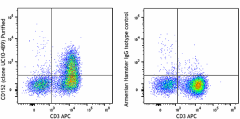
-

Con A+IL-2-stimulated C57BL/6 splenocytes (3 days) were stained with CD3 APC and CD152 (clone UC10-4B9) Purified (left) or Purified Armenian Hamster IgG isotype control (right) followed by PE anti-Armenian Hamster IgG.
| Cat # | Size | Price | Quantity Check Availability | Save | ||
|---|---|---|---|---|---|---|
| 106327 | 100 µg | 141€ | ||||
| 106328 | 1 mg | 498€ | ||||
CD152, also known as CTLA-4 or Ly-56, is a 33 kD member of the immunoglobulin superfamily. It is expressed on activated T and B lymphocytes. CD152 is similar to CD28 in amino acid sequence, structure, and genomic organization and these two receptors share common B7 family counter-receptors (B7-1, B7-2). Whereas CD28 delivers a costimulatory signal in T cell activation, CTLA-4 negatively regulates cell-mediated immune responses. CD152 is thought to play a role in the induction and maintenance of immunological tolerance as well as the development of protective immunity and thymocyte regulation.
Product DetailsProduct Details
- Verified Reactivity
- Mouse
- Antibody Type
- Monoclonal
- Host Species
- Armenian Hamster
- Immunogen
- Mouse CTLA-4-mouse IgG2a fusion protein
- Formulation
- 0.2 µm filtered in phosphate-buffered solution, pH 7.2, containing no preservative.
- Endotoxin Level
- Less than 0.01 EU/µg of the protein (< 0.001 ng/µg of the protein) as determined by the LAL test.
- Preparation
- The Ultra-LEAF™ (Low Endotoxin, Azide-Free) antibody was purified by affinity chromatography.
- Concentration
- The antibody is bottled at the concentration indicated on the vial, typically between 2 mg/mL and 3 mg/mL. Older lots may have also been bottled at 1 mg/mL. To obtain lot-specific concentration and expiration, please enter the lot number in our Certificate of Analysis online tool.
- Storage & Handling
- The antibody solution should be stored undiluted between 2°C and 8°C. This Ultra-LEAF™ solution contains no preservative; handle under aseptic conditions.
- Application
-
FC - Quality tested
IP, ELISA, Block - Reported in the literature, not verified in house - Recommended Usage
-
Each lot of this antibody is quality control tested by immunofluorescent staining with flow cytometric analysis. For flow cytometric staining, the suggested use of this reagent is ≤ 1.0 µg per million cells in 100 µl volume. It is recommended that the reagent be titrated for optimal performance for each application.
- Application Notes
-
The UC10-4B9 antibody can enhance T cell co-stimulation by blocking CTLA-4 interactions with the B7 co-receptors, favoring CD28 interactions. Additional reported applications (for the relevant formats) include: immunoprecipitation1, in vitro stimulation, in vitro and in vivo blocking1-4 of ligand binding, and as ELISA capture antibody5. To reduce non-specific binding to cells bearing Fc-receptors, pre-incubation of cells with anti-mouse CD16/CD32, clone 93 (Cat. No. 101301/101302), is recommended prior to immunofluorescent staining. For most successful immunofluorescent staining results, it may be important to maximize signal over background by using a relatively bright fluorochrome-antibody conjugate (Cat. No. 106306) or by using a high sensitivity, three-layer staining technique (e.g., including a biotinylated anti-Armenian hamster IgG (Cat. No. 405501) second step, followed by SAv-PE (Cat. No. 405204)). The Ultra LEAF™ purified antibody (Endotoxin < 0.01 EU/µg, Azide-Free, 0.2 µm filtered) is recommended for functional assays (Cat. No. 106327).
- Application References
-
- Walunas TL, et al. 1994. Immunity 1:405. (Block, IP)
- Cilio CM, et al. 1998. J. Exp. Med. 188:1239. (Block)
- Issazadeh S, et al. 1999. J. Immunol. 162:761. (Block)
- McCoy K, et al. 1997. J. Exp. Med. 186:183. (Block)
- Hsu HC, et al. 2007. J. Immunol. 178:5357. (ELISA Capture)
- Sugita S, et al. 2010. Invest. Ophthalmol. Vis. Sci. 51:5783. PubMed
- RRID
-
AB_2810343 (BioLegend Cat. No. 106327)
AB_2810343 (BioLegend Cat. No. 106328)
Antigen Details
- Structure
- Ig superfamily, 33 kD
- Distribution
-
Activated T cells and B cells
- Function
- Negative regulator of T cell activation
- Ligand/Receptor
- CD80 (B7-1), CD86 (B7-2)
- Cell Type
- B cells, T cells, Tregs
- Biology Area
- Immunology
- Molecular Family
- CD Molecules, Immune Checkpoint Receptors
- Antigen References
-
1. Barclay A, et al. 1997. The Leukocyte Antigen FactsBook Academic Press.
2. Allison JP, et al. 1995. Science 270:932.
3. Waterhouse P, et al. 1995. Science 270:985.
4. Linsley PS, et al. 1991. J. Exp. Med. 174:561. - Gene ID
- 12477 View all products for this Gene ID
- UniProt
- View information about CD152 on UniProt.org
Related FAQs
- Do you guarantee that your antibodies are totally pathogen free?
-
BioLegend does not test for pathogens in-house aside from the GoInVivo™ product line. However, upon request, this can be tested on a custom basis with an outside, independent laboratory.
- Does BioLegend test each Ultra-LEAF™ antibody by functional assay?
-
No, BioLegend does not test Ultra-LEAF™ antibodies by functional assays unless otherwise indicated. Due to the possible complexities and variations of uses of biofunctional antibodies in different assays and because of the large product portfolio, BioLegend does not currently perform functional assays as a routine QC for the antibodies. However, we do provide references in which the antibodies were used for functional assays and we do perform QC to verify the specificity and quality of the antibody based on our strict specification criteria.
- Does BioLegend test each Ultra-LEAF™ antibody for potential pathogens?
-
No, BioLegend does not test for pathogens in-house unless otherwise indicated. However, we can recommend an outside vendor to perform this testing as needed.
- Have you tested this Ultra-LEAF™ antibody for in vivo or in vitro applications?
-
We don't test our antibodies for in vivo or in vitro applications unless otherwise indicated. Depending on the product, the TDS may describe literature supporting usage of a particular product for bioassay. It may be best to further consult the literature to find clone specific information.
Other Formats
View All CD152 Reagents Request Custom Conjugation| Description | Clone | Applications |
|---|---|---|
| Biotin anti-mouse CD152 | UC10-4B9 | FC |
| PE anti-mouse CD152 | UC10-4B9 | FC |
| Purified anti-mouse CD152 | UC10-4B9 | FC,IP,ELISA,Block |
| APC anti-mouse CD152 | UC10-4B9 | FC |
| Brilliant Violet 421™ anti-mouse CD152 | UC10-4B9 | FC |
| PE/Cyanine7 anti-mouse CD152 | UC10-4B9 | FC |
| PerCP/Cyanine5.5 anti-mouse CD152 | UC10-4B9 | FC |
| PE/Dazzle™ 594 anti-mouse CD152 | UC10-4B9 | FC |
| Brilliant Violet 605™ anti-mouse CD152 | UC10-4B9 | FC |
| TotalSeq™-A0388 anti-mouse CD152 | UC10-4B9 | PG |
| Ultra-LEAF™ Purified anti-mouse CD152 | UC10-4B9 | FC,IP,ELISA,Block |
| TotalSeq™-C0388 anti-mouse CD152 | UC10-4B9 | PG |
| TotalSeq™-B0388 anti-mouse CD152 | UC10-4B9 | PG |
| PE/Fire™ 640 anti-mouse CD152 | UC10-4B9 | FC |
| PE/Fire™ 810 anti-mouse CD152 | UC10-4B9 | FC |
| PE/Cyanine5 anti-mouse CD152 | UC10-4B9 | FC |
Compare Data Across All Formats
This data display is provided for general comparisons between formats.
Your actual data may vary due to variations in samples, target cells, instruments and their settings, staining conditions, and other factors.
If you need assistance with selecting the best format contact our expert technical support team.
-
Biotin anti-mouse CD152
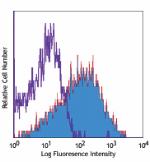
Con A+IL-2-stimulated (day-2) Balb/c mouse splenocytes stain... -
PE anti-mouse CD152
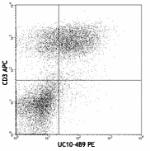
Con A+IL-2-stimulated BALB/c splenocytes (day-2) were staine... -
Purified anti-mouse CD152

Con A+IL-2-stimulated C57BL/6 splenocytes (3 days) were stai... -
APC anti-mouse CD152
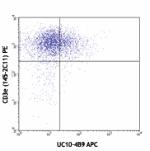
Con A+IL-2-stimulated C57BL/6 splenocytes (3 days) stained w... 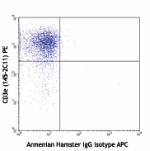
Con A+IL-2-stimulated C57BL/6 splenocytes (3 days) stained w... -
Brilliant Violet 421™ anti-mouse CD152
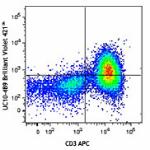
Con A+IL-2-stimulated C57BL/6 splenocytes (3 days) were stai... 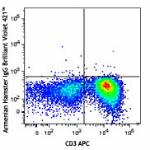
-
PE/Cyanine7 anti-mouse CD152

Con A+IL-2-stimulated C57BL/6 splenocytes (3 days) were stai... -
PerCP/Cyanine5.5 anti-mouse CD152

Con A+IL-2-stimulated C57BL/6 splenocytes (day 3) were stain... -
PE/Dazzle™ 594 anti-mouse CD152
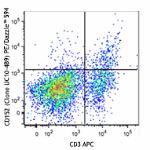
Con A+IL-2-stimulated C57BL/6 splenocytes (3 days) were stai... 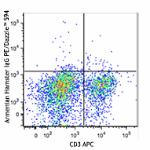
-
Brilliant Violet 605™ anti-mouse CD152
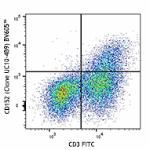
Con A+IL-2-stimulated C57BL/6 splenocytes (three days) were ... 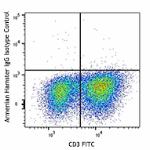
-
TotalSeq™-A0388 anti-mouse CD152
-
Ultra-LEAF™ Purified anti-mouse CD152

Con A+IL-2-stimulated C57BL/6 splenocytes (3 days) were stai... -
TotalSeq™-C0388 anti-mouse CD152
-
TotalSeq™-B0388 anti-mouse CD152
-
PE/Fire™ 640 anti-mouse CD152

Con A+IL-2-stimulated C57BL/6 splenocytes (3 days) were stai... -
PE/Fire™ 810 anti-mouse CD152

Con A+IL-2-stimulated C57BL/6 splenocytes (3 days) were stai... -
PE/Cyanine5 anti-mouse CD152

Con A+IL-2 stimulated C57BL/6 splenocytes (3 days) were stai...
 Login / Register
Login / Register 









Follow Us